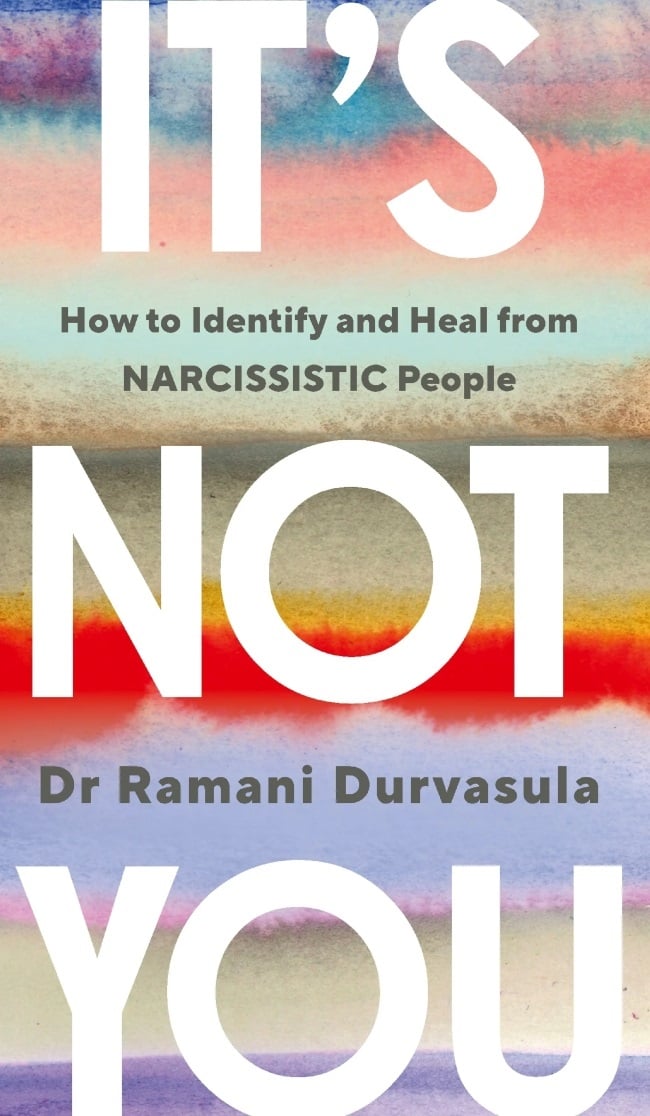
For years in her practice she saw client after client who came to her feeling frustrated, depressed, confused and sad.
As a clinical psychologist, Dr Ramani Durvasula had been taught to help people identify their own patterns and behaviours and learn useful coping strategies.
But she was struck by the similarities in many of her client’s stories, even though they were very different people with very different stories.
“All of them felt they were to blame for their situations – they doubted themselves, ruminated, felt ashamed, were psychologically isolated, confused and helpless,” she says.
She saw another significant similarity – the behaviours exhibited by difficult people in her clients’ lives.
“Regardless of whether it was a spouse, partner, parent, other family member, adult child, friend, colleague, boss – my clients consistently shared stories of being invalidated or shamed for having a need or for expressing or being themselves,” she says.
What underpinned it all was narcissistic behaviour, and understanding this personality style – and how to help those affected by it – became her passion.
She’s written three books on the subject and her YouTube channel has more than 1,6 million subscribers.
In this extract from her latest book, It’s Not You: How to Identify and Heal from Narcissistic People, she unpacks this often misunderstood personality and reveals some of the telltale behaviours that indicate you may be dealing with a narcissist.
HOW TO SPOT A NARCISSIST
Narcissism is the word of our time, and yet it’s deeply misunderstood.
It would be easier if narcissistic people were simply mirror-gazing, self-involved poseurs, but they are much more than that. They are an emotionally abusive romantic partner who belittles you but with whom you sometimes have fun. A toxic boss who berates you in front of your colleagues but whose work you greatly admire. A parent who is jealous of your success but who showed up to all your soccer games when you were a child. A friend who is forever a victim and drones on endlessly about what’s going on in their life with little interest in yours but who has been in your life since you were thirteen.
Even these snapshots fail to capture the complexity that is narcissism. You yourself have likely had one or more relationships with a narcissistic person – and may not have even known it.
What separates a narcissistic person from someone who is self-centred or vain or entitled is the consistency and sheer number of these traits in one person.
But what is also important is the function of these traits – which is to protect the narcissistic person. Narcissism is about deep insecurity and fragility, offset by behaviours like domination, manipulation and gaslighting, which allow the narcissistic person to stay in control.
Because there is such a wide spectrum of narcissism, from mild to severe, people can have very different experiences of this personality style in their relationships.
The middle of this spectrum – with enough bad days to take a toll and enough good days to keep you hooked – is where many people are stuck, and that “moderate narcissism” is where we will focus.
Let’s take a closer look at some narcissistic traits.
A need for narcissistic supply
Narcissistic people need validation and admiration, and this need motivates much of their behaviour. They seek out status, compliments, excessive recognition and attention, and this may happen through ostentatious wealth, physical appearance, friends who fawn over them or social media likes and follows.
This validation from other people or the world at large is called narcissistic supply.
Their moods can turn rather dark, and they can become irritable, resentful, sullen, and aggrieved when they do not get the validation they feel entitled to.
Consistent inconsistency
When the narcissistic person feels they are in control, and they have sufficient narcissistic supply – for instance, work is going well, they are getting compliments, they are in a fun new relationship, or they just got a new car – they may be less antagonistic and more pleasant.
Unfortunately, the narcissistic supply gets stale quickly, so they always need more, new, better.
I recall working with a narcissistic person who said one afternoon, “I am having the best day ever, I scored a big new deal, I’m the man, I slay it every time, right?”
That evening, he left a message saying that he was angry and that his life isn’t fair. I came to find out that this change in his emotional state was because the new person he was dating had to reschedule dinner. It can turn that quickly.
Delusional grandiosity
They have exaggerated beliefs about their own importance in the world, fantastical beliefs about their current or future success, a sense of superiority over other people and a sense of a uniqueness and specialness about themselves not observed in others.
They believe they are better than others, and it is delusional because for most narcissistic people there is little to no evidence supporting any of these beliefs.
Shifting masks
Narcissists often swing between charming, fun and charismatic (or at least normal and regulated), to abusive, sullen and enraged.
Their self-appraisal is high when things are going their way, and when things are not, they blame the world and shift to viewing themselves as a victim. As a result, you can’t always anticipate which version of the narcissist you will be dealing with – the grandiose and cheerful one or the dejected, victimised and angry one. Makes for a bit of a wild and uncomfortable ride.
Entitlement
Entitlement is a core pattern of narcissism, and one of the most problematic.
Narcissistic people believe they are special, must be given special treatment, can only be truly understood by other special people, and that the rules should not apply to them.
If rules are applied to them or they are held accountable, narcissistic folks become angry and push back because those rules are for ordinary people!
They feel entitled to do and say what they want, whenever they want. Their entitlement serves as a way for them to create a reality in which they can exert their specialness, and it drives their anger when they don’t feel they are being regarded as a VIP.
Most of us can probably recall a time when a narcissistic person’s entitlement left us feeling uncomfortable.
One woman shared with me the mortification she would feel when her husband would raise his voice and bark at restaurant servers when he didn’t get his way.
She said she got good at keeping her head down in shame in those situations so she never had to make eye contact with the people left in her husband’s wake.
Sadly, she felt complicit in their mistreatment because she didn’t stop him, yet stopping him meant enduring his tantrums or silent treatment for days.
READ MORE| The PM’s supporter or master manipulator? Boris Johnson’s wife comes under fire
Being thin-skinned
Narcissistic folks can dish it out but they cannot take it. When you give them even the mildest critique or feedback, be prepared for rapid, rageful and disproportionate reactions.
This is often juxtaposed against their chronic need for reassurance: they will not ask for it, but despite their arrogant exteriors, it’s clear they need to be soothed and told that everything is going to be okay.
Offering reassurance is a treacherous dance, however, because if your soothing is too transparent, they will lash out at you for reminding them of their weak-ness.
I worked with a woman who was obsessed with appearances. For her birthday party she decorated her home with impeccable care but took little consideration of other people’s financial or time limitations. When her family was busy with other stuff, she experienced this as a direct attack and complained that nobody appreciated her.
Her son tried to reassure her: “Don’t worry, Mom, we’ll make sure we’re right on time for your birthday, and we’re going to get you that cake you love, and ice cream, and have lots of presents and a big dinner. It’s going to be the best birthday ever.” She lashed back, “Don’t treat me like I’m a six- year- old, you make it seem like I’m crazy.”
The dance between the narcissistic reactive sensitivity to feedback, their need for reassurance and chronic sense that they are a victim, and their shame and subsequent rage at having these vulnerabilities reminds us of the essence of narcissistic relationships: you can’t win.
Inability to self-regulate
Narcissistic people cannot manage their emotions. They don’t know how to express them, so they cannot regulate them. The narcissistic person isn’t saying, “Hey, I’m going to cover my insecurity with some grandstanding,” nor are they rubbing their hands together wondering, “How can I hurt you?”
Their lashing out is unprocessed stuff, which is why even a mild critique or crisis can set off shame about their vulnerability or imperfection being on full display.
Impulsivity and a lack of empathy mean they can’t stop and catch themselves and consider how their lashing out may hurt you.
Instead, they will issue a hollow apology and get frustrated if you try to hold them accountable.
Need for dominance
Narcissistic folks are motivated by dominance, status, control, power and the desire to be special. Intimacy and closeness are not motivating for them. What they need is to always have the upper hand.
So if your relationship motivation is deep emotional connection or intimacy, the two of you are dancing very different steps.
Relationships exist largely for the narcissistic person’s benefit and pleasure. They aren’t interested in the give-and-take that a healthy relationship requires, or in the needs of others.
READ MORE| People who post gym selfies on Facebook are narcissists, science says
Being incredibly charming
If narcissistic people are entitled, rageful, manipulative and invalidating, why don’t we see these behaviours early and get the hell away?
Because narcissistic people have great game.
They are charming, charismatic, confident, curious and often very well put together and intelligent.
While you may not consider arrogance to be desirable, there is often the assumption that behind that arrogance and confidence, a person has the goods to back it up.
You may also be willing to excuse a lot of bad behaviour if you believe someone is smart or successful.
Narcissism is often conflated with success, and instead of being viewed as a toxic and unhealthy pattern, it’s viewed as swagger and un-bridled ambition.
Narcissistic people are skilled shape-shifters and chameleons and have an uncanny ability to camouflage themselves, get close and then behave badly.
© This is an edited extract from It’s Not You: How to Identify and Heal from Narcissistic People by Dr Ramani Durvasula, published by Vermilion, R319 on TAKEALOT.COM. Price correct at the time of going to print and subject to change without notice.




 Publications
Publications
 Partners
Partners





















